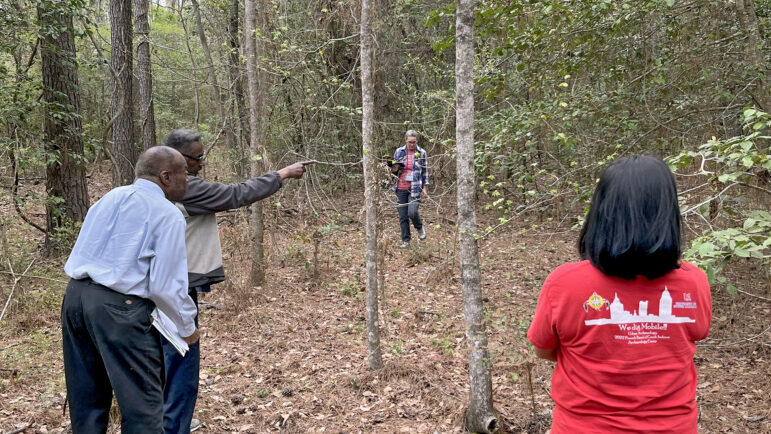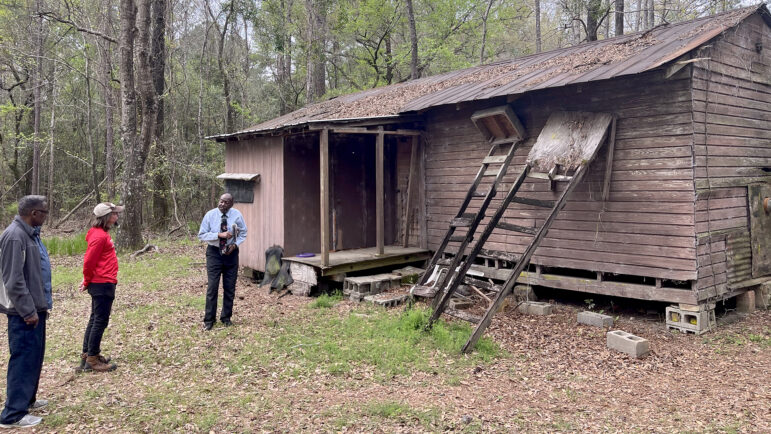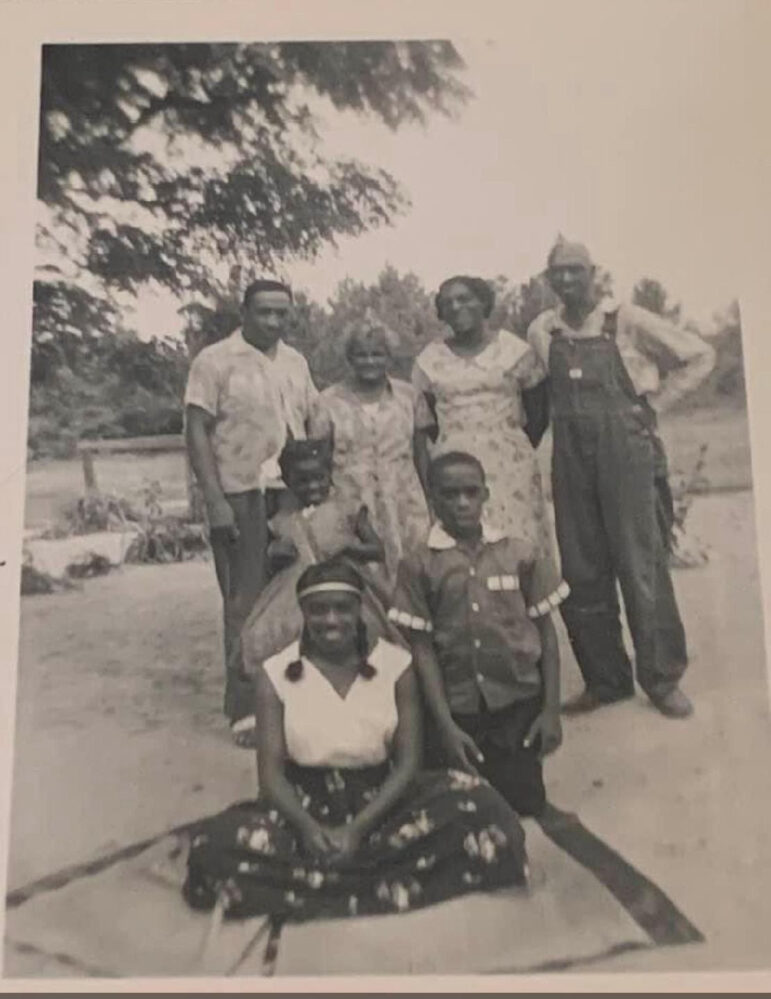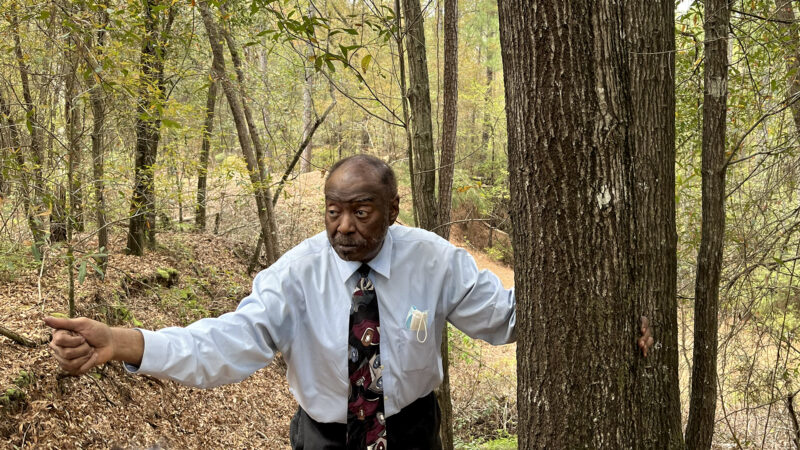A family’s search for their native and formerly enslaved heritage in South Alabama
Franklin Tate and his family have spent the last 15 years uncovering their history and finding their family’s property in Little River, Alabama, northeast of Mobile.
Wilted leaves and pine straw cover the forest floor as Franklin Tate hikes between trees and over-rotted stumps in Little River, Alabama.
Tate, a Birmingham resident, is joined by the University of South Alabama Center for Archeological Studies and the Poarch Creek Band of Indians, on his trek. Together, they’re searching for something lost more than 60 years ago — a house belonging to Tate’s grandparents on the Tate-Moniac Homestead, where they had settled in the early 1900s.
The search for the home has been more than 15 years in the making. Tate’s research began after his aunt found a deed for the parcel of land they were walking through on this cloudy March day. He’s collected records, landrolls and photos ever since.
“The last few years, over the last decade, we’ve been doing that research and I just got blown away,” Tate said.

It’s complicated to untangle, but the story of this land and Tate’s family goes back to before Alabama was a state.
Tate’s third-great-grandfather David was the last chief of the Creek Nation. The Lower Town Creek Indians were allies with America during the War of 1812. When Native people were forced out of Alabama in the 1830s, the Tates were allowed to stay. Former President Grover Cleveland even signed the deed for the Tate-Moniac Homestead.
“We found this deed was sent in 1895 to Todd Tate,” Tate said. “I said, ‘It can’t be Papa. Papa was born in 1880. He would have been 15 years old.’”
After a 45-minute trek through the forest, Tate emerges beneath a canopy of oaks, miles from the nearest paved road. He stares out into a clearing at a brown house with cobwebs and rust in the windows. Purple water irises bloom near the edge of a dirt path that hasn’t been driven over in decades.
“I would have never found it,” he said, and his steps quickened. “Thank God. Thank God.”

Tate said he hadn’t been here since he was a little boy. The original structure burned down nearly 60 years ago and his ancestors rebuilt it. Family members moved away and settled in other parts of the state, leaving the property to the occasional squatter or hunters seeking shelter.
But Tate can remember how the home looked when he visited as a child, with columns and chairs near the front where he could look out into the vast green field.
Tate’s brother, Kenneth, also remembers visiting this land when they were children. He’s not a researcher, but he supports Franklin, whom he affectionately called their family’s own Alex Haley, the African-American author who published “Roots.” Kenneth said it was a relief to uncover this pivotal piece of the puzzle.

“In a state like Alabama, it’s great to know that we did have something to show for the hard work that our forefathers went through,” Kenneth Tate said. “I would love to see something really, really good come out of it for not just us to benefit, but people as a whole. This area has a whole lot of history that I guess we just didn’t know.”
For now, the Tates will continue exploring their acreage in South Alabama, placing pins in the timelines of their history as they go. Franklin said he hopes that in the future, they’ll receive a nomination and a permanent marker from the National Register of Historic Places.
“We are just trying to see what we can access through our story to tell America’s story,” Tate said.
This story was produced by the Gulf States Newsroom, a collaboration between Mississippi Public Broadcasting, WBHM in Alabama, WWNO and WRKF in Louisiana and NPR.
Populist conservative Laura Fernández wins Costa Rica’s presidential election
Candidate Laura Fernández won a resounding victory, promising to continue the aggressive reorienting of the Central American nation's politics started by her predecessor.
What Jared Kushner’s ‘New Gaza’ plan includes, and what it leaves out
President Trump's son-in-law Jared Kushner laid out a plan for a "New Gaza." A close look suggests it makes room for fewer Palestinians and less housing.
Trump administration sued over visa freeze on immigrants from 75 countries
A group of nonprofit organizations and U.S. citizens Monday filed a lawsuit challenging the Trump administration's sweeping suspension of immigrant visa processing for people from nearly half of the world's countries.
Tuskegee men’s basketball coach handcuffed after intervening in postgame incident
A statement from civil rights attorney Harry Daniels' office said Benjy Taylor was concerned about Morehouse football players who “were acting aggressively” toward Tuskegee players and their parents during postgame handshakes on Saturday.
U.S. sledder Katie Uhlaender appeal denied, won’t race at Milan Cortina Olympics
International officials say a point-rigging scheme denied American Katie Uhlaender a shot to compete in the Milan Cortina Olympics. But a sports tribunal based in Switzerland says it can't intervene.
The Trump Administration exempts new nuclear reactors from environmental review
The announcement comes just days after NPR revealed the administration had secretly rewritten safety and environmental standards.








